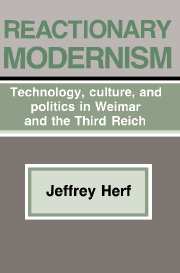Book contents
- Frontmatter
- Contents
- Preface
- 1 The paradox of reactionary modernism
- 2 The conservative revolution in Weimar
- 3 Oswald Spengler: bourgeois antinomies, reactionary reconciliations
- 4 Ernst Jünger's magical realism
- 5 Technology and three mandarin thinkers
- 6 Werner Sombart: technology and the Jewish question
- 7 Engineers as ideologues
- 8 Reactionary modernism in the Third Reich
- 9 Conclusion
- Bibliographical essay
- Index
1 - The paradox of reactionary modernism
Published online by Cambridge University Press: 31 October 2009
- Frontmatter
- Contents
- Preface
- 1 The paradox of reactionary modernism
- 2 The conservative revolution in Weimar
- 3 Oswald Spengler: bourgeois antinomies, reactionary reconciliations
- 4 Ernst Jünger's magical realism
- 5 Technology and three mandarin thinkers
- 6 Werner Sombart: technology and the Jewish question
- 7 Engineers as ideologues
- 8 Reactionary modernism in the Third Reich
- 9 Conclusion
- Bibliographical essay
- Index
Summary
There is no such thing as modernity in general. There are only national societies, each of which becomes modern in its own fashion. This study examines a cultural paradox of German modernity, namely, the embrace of modern technology by German thinkers who rejected Enlightenment reason. Dichotomies – tradition or modernity, progress or reaction, community or society, rationalization or charisma – predominate in sociological theories of the development of European modernity. When applied to modern German history, such dichotomies suggest that German nationalism, and subsequently National Socialism, was primarily motivated by rejections of modernity – the political values of the French Revolution and the economic and social realities created by the Industrial Revolution. Romantic Germany, we are told, rejected scientistic modernity. Had the pastoral vision vanquished technological advance, German modernity would not have led to the German catastrophe. In this study of a cultural tradition I have called reactionary modernism, I am advocating a more nuanced view of German ideology in the Weimar Republic and the Third Reich.
My basic point is the following: Before and after the Nazi seizure of power, an important current within conservative and subsequently Nazi ideology was a reconciliation between the antimodernist, romantic, and irrationalist ideas present in German nationalism and the most obvious manifestation of means–ends rationality, that is, modern technology. Reactionary modernism is an ideal typical construct. The thinkers I am calling reactionary modernists never described themselves in precisely these terms. But this tradition consisted of a coherent and meaningful set of metaphors, familiar words, and emotionally laden expressions that had the effect of converting technology from a component of alien, Western Zivilisation into an organic part of German Kultur.
- Type
- Chapter
- Information
- Reactionary ModernismTechnology, culture, and politics in Weimar and the Third Reich, pp. 1 - 17Publisher: Cambridge University PressPrint publication year: 1985



